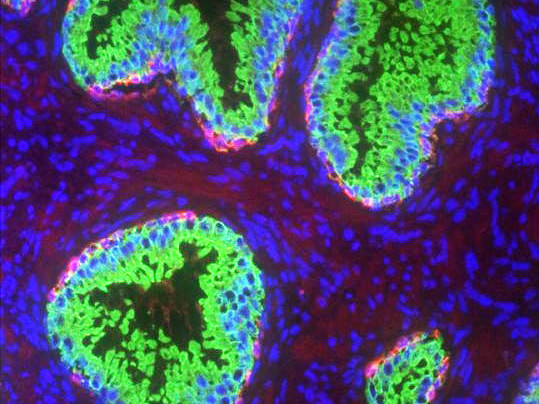Prostate cells that look normal under the microscope may be hiding genetic mutations that could develop into cancer, prompting new ways to improve treatment for the disease, according to research published in Nature Genetics.
The research – funded by Cancer Research UK, the Dallaglio Foundation and the Wellcome Trust – shows that in some men who have prostate cancer, non-cancerous prostate cells that appear normal under the microscope can have lots of different genetic mutations.
The research was part of the International Cancer Genome Consortium (ICGC) prostate cancer project. Collaborators include The Institute of Cancer Research, London, Cancer Research UK, the Wellcome Trust Sanger Institute, University of East Anglia, and the University of Cambridge.
Prostate cancer is often made up of many small tumours with different genetic fingerprints, and it is still unclear what causes these different tumours to develop in the prostate at the same time. But this new research provides a piece of the puzzle that could help solve the mystery.
The results suggest that large numbers of normal-looking prostate cells have a variety of genetic faults and cancer could develop from any of them. This could explain why prostate cancer is often made up from multiple genetically different tumours and suggests that prostate cancer development begins earlier than scientists thought.
The findings may lead to a rethink of prostate cancer treatment, in which these pre-cancerous cells are destroyed at the same time as the tumour cells.
Study author Professor Ros Eeles, Professor of Oncogenetics at the ICR, and Honorary Consultant at The Royal Marsden NHS Foundation Trust, said: “When we examine the cells that lie close to prostate cancer under the microscope, we look at their shape, size and relationship to surrounding cells. If everything appears normal then we may assume that we’re looking at healthy tissue.
“But thanks to genetic sequencing we’ve shown that some of these normal-looking cells are already carrying genetic mistakes that are linked to the cancer nearby. This research helps us understand more about the beginnings of prostate cancer, so we can tackle the disease at its roots.”
Professor David Neal, study author at the University of Cambridge, said: “The discovery of widespread changes in these normal looking cells needs to be checked in more men but, if true, it will raise questions about the impact of treating only the cancer and leaving the rest of the prostate behind.”
The research forms part of the International Cancer Genome Consortium (ICGC), a global project using the latest genome sequencing technology to reveal the genetic changes driving the disease. Cancer Research UK scientists are mapping the genetic history of prostate and oesophageal cancers as part of this international effort.
Professor Peter Johnson, Cancer Research UK’s chief clinician, said: “As we learn more about cancer, we discover just how complex an enemy it is. We don’t know whether cells with mutations will always turn into cancer, and we need to find out what controls this process.
“We’re finding new ways to detect precancerous cells, and this will give us the tools to prevent them becoming a threat in the future. This latest research provides powerful new insights into prostate cancer that we hope will help more men beat the disease.”
